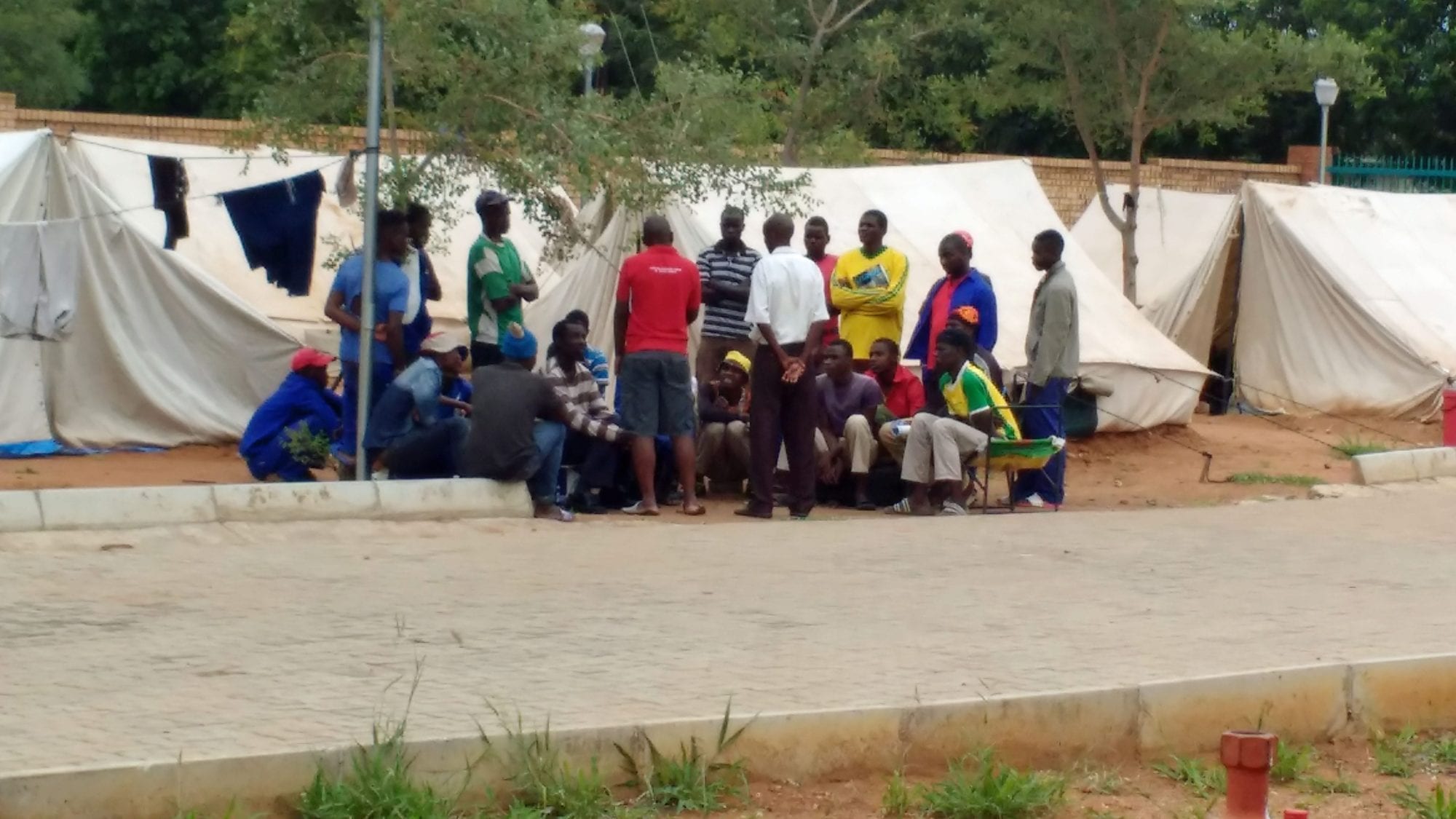
Jan 22, 2016
In Lephalale, South Africa, a coal mining town near the Botswana border, more than 70 farm workers, including 19 women, are crowded into a handful of tents in a disaster relief center after fleeing the commercial farm owner who shut off water and electricity in their company-run homes for months after they asked for a wage increase.
The Zimbabwean migrants worked on four vegetable farms operated by Johannesberg Farm, regularly putting in 12-hour days, seven days a week, and forced to toil 17-hour days during the harvest. Yet when the workers, who are paid $120 per month, roughly half the legal minimum wage, requested a 59-cent-per-day pay increase in August, the farm owner waged a months-long battle against them.

Farm workers Edias (second from right) and Thembani (far right) met this week with Catholice Moraba of FAWU and Sikha Magutshwa and Mandla Masuku of MIWUSA at the disaster relief camp. Credit: Solidarity Center
The workers told Solidarity Center staff who traveled to Lephalale this week that in September, a group of men led by the farm owner fired rubber bullets at the workers’ homes and set some of them on fire to drive workers out of their homes so they could assault and club them. One of the workers, Edias, says he and four other workers were then kidnapped, tortured and interrogated for hours before police arrived. (For farm workers’ safety, we are using first names only.)
Now 23, Edias was 12 years old when he first came to South Africa to work. The beating to his back and head was so severe that he suffers from back and body pain and likely will never again be able to work in hard physical labor.
Unable to leave to look for other jobs because the farm owner had confiscated their work papers, Edias and the workers stayed in their camp dwellings near the farm until December. Then, near starvation, they walked miles to the police station at Villa Nora where they camped before they were relocated to Lephalale.
Thousands of Migrant Farm Workers Paid Subminimum Wages, Suffer Physical Abuse
“The farmer only hires Zimbabweans,” says Thembani, a farm worker who fled Johannesberg Farm. “He said he won’t hire South Africans because they know the law.”
The migrant farm workers stranded in Lephalale are only a few of the thousands of farm workers across the country who are paid sub-minimum wages, forced to toil in harsh conditions that are illegal under South African labor law and often being physically abused. The conditions are especially brutal for women.
Women farm workers at the Johannesberg Farm say they cut, sorted and packed produce, often until 11 p.m., when only headlights from a farm truck illuminated their workspace. If they questioned the amount of wages they received in a pay period, farm managers beat them. Children were not allowed to go to school and so were left behind in Zimbabwe with relatives. If the women were injured, they were forced to wait until the end of the day’s work before they were taken to a clinic and were expected to return to work the next day.
McIan, 50, is among the exiled farm workers. After 15 years of hard work on the Johannesberg Farm, he put his livelihood on the line to join his co-workers in Lephalale. Even though the farm owner offered him two weeks’ pay to return to work—among the highest offers—he refused. McIan says he acted in solidarity with the other workers because “this farmer is cruel, and this is not right. Let me stand with my brothers.”
McIan said the farm owner regularly beat workers, accusing them of not working hard. Like Edias, McIan crossed the border from Zimbabwe into South Africa at age 12, and eventually was hired at the Johannesberg Farm where he helped grow and harvest potatoes, tomatoes, maize and onions.
Solidarity Center and Allies Seeking Justice for the Zimbabwe 70
Now, McIan and the other farm workers at the disaster relief camp are housed in tents so thin they would not withstand a strong storm. The camp has one toilet and no sewer drainage, and the workers subsist on a diet of rice and pap, a ground meal staple prevalent across Africa.
The vast majority of Zimbabwe’s 15 million people are forced to eke out a living in the informal economy or in subsistence farming, with many migrating to South Africa in the hope of supporting themselves and their families.
The Solidarity Center, in coalition with our allies the South African Food and Allied Workers Union (FAWU), the Migrant Workers Union of South Africa and other organizations, is asking South African government agencies and the Zimbabwean consulate to provide temporary work permits to allow them work and stay in the country until their legal claims have been resolved and to be returned to their jobs with back pay.
Further, the coalition is asking the South African government to comprehensively inspect the conditions of farm workers; properly investigate reports of human rights abuses; ensure farm workers receive wages in line with the country’s minimum wage laws and penalize repeated violators.
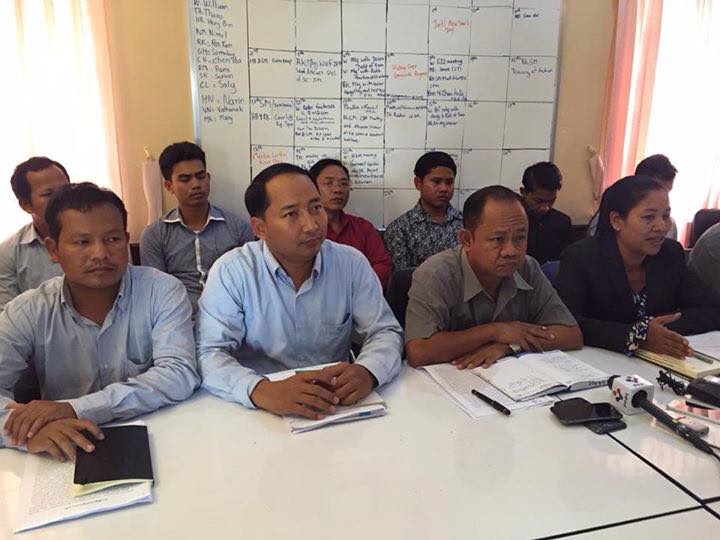
Jan 20, 2016
Union leaders are asking the Cambodia Royal Government and National Assembly to suspend adoption of a pending trade union law because of restrictions it would place on the freedom to form unions, collectively bargain and strike.
Following a strategy meeting today chaired by the International Trade Union Confederation Cambodia Coordinating Council, a dozen union leaders issued a joint statement calling on parliament to accept the group’s 17 previously submitted proposals. Unions want to see the draft labor law expanded to cover domestic workers, civil servants, state employees and informal economy workers, and seek more protections for the right to form unions and bargain collectively, in accordance with international labor standards.
The law “visibly restricts” worker rights that are recognized by the International Labor Organization (ILO), including the freedoms to form unions and bargain collectively, the unions said in a statement released at a press conference following their meeting.
The unions added that is essential to align Cambodian law with the international conventions it has ratified, including ILO conventions, as well as for promoting “the interests of all the workers and society, as well as our next generation.”
Union leaders have met several times with members of the Special Committee of the Parliament in charge of drafting the law, but say their detailed responses and recommendations have not been seriously considered.
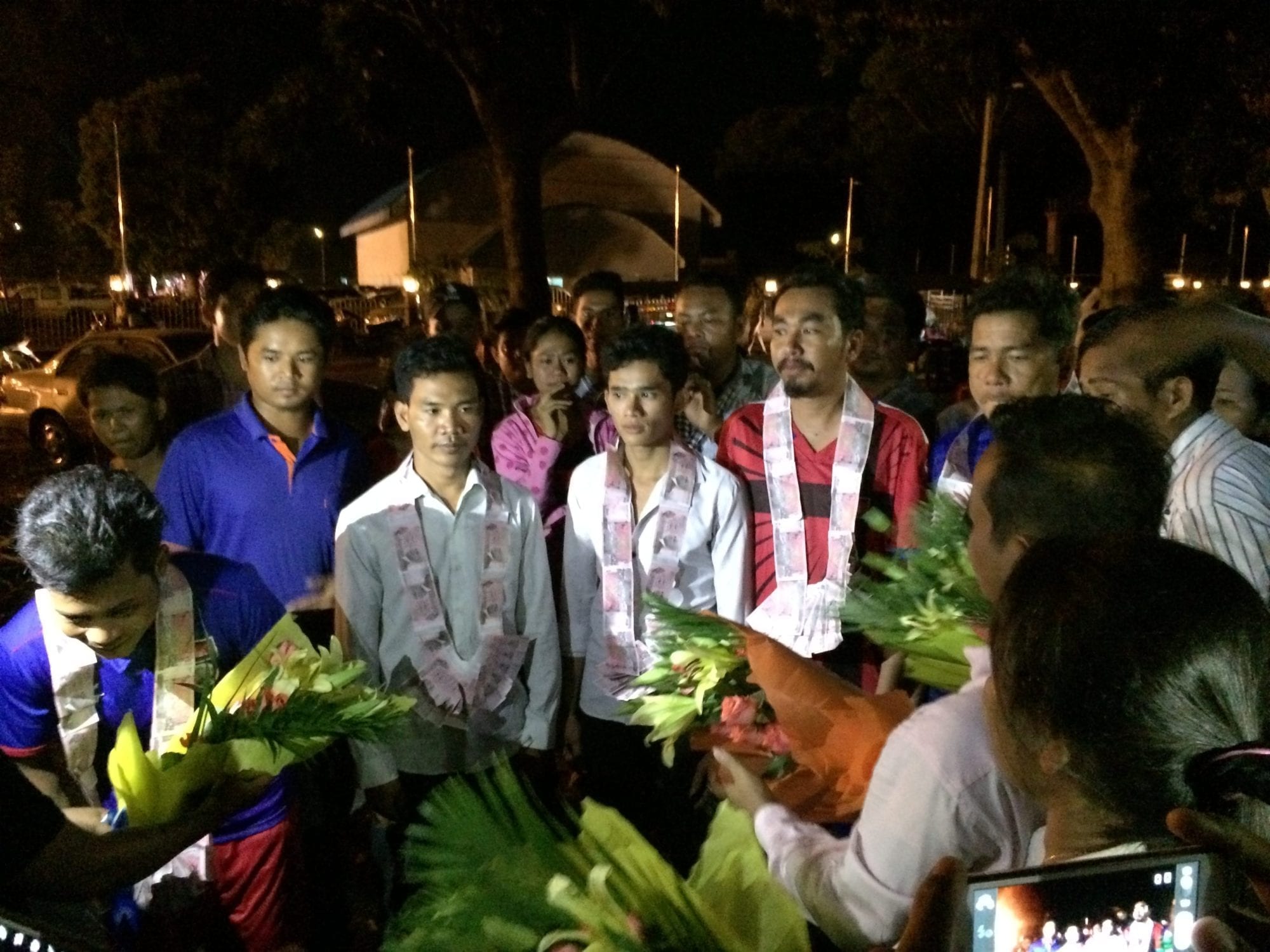
Jan 19, 2016
Five leaders of the Collective Union of Movement of Workers (CUMW) in Cambodia were released from detention today after spending nearly a week in prison for seeking to assist striking garment factory workers who sought their support. The Solidarity Center legal team in Phnom Penh was instrumental in securing the five men’s freedom.
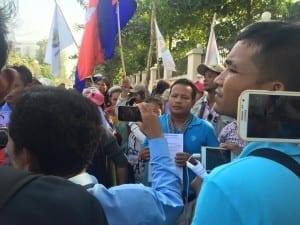
CUMW President Pav Sina said without support from the Solidarity Center, the union would have been unable to secure justice for the five organizers. Credit: Solidarity Center
Speaking at a gathering this evening to mark the release of the five union leaders, CUMW President Pav Sina said without support from the Solidarity Center, the union would have been unable to secure justice for the five organizers.
The organizers say they were beaten and arrested on January 12 when they sought to meet with the workers at the factory. Five other workers were beaten, with four suffering serious injuries to their eyes, heads and hands. The workers, who make sweaters, had sought the union’s assistance in helping them achieve workplace improvements that include lengthening work contracts from three months to a year; doubling daily pay for holiday work; and providing additional piece work pay.
At a rally in early January, the five CUMW leaders joined workers outside the factory in a solidarity rally which was disrupted when the president of the employer-controlled union ordered his group of workers to destroy CUMW materials and loud speakers. Several days later, more than 400 workers protested outside buildings housing the Prime Minister and National Assembly to further press for their rights at work and the next day, more than 500 workers gathered at the factory and at the court to demand release of the union organizers.
Short-term Contracts Make It Hard for Workers to Win Better Wages
Cambodia’s garment workers “often experience discriminatory and exploitative labor conditions” according to a Human Rights Watch report last year, which cited short-term contracts as contributing to the often abusive conditions.
“The combination of short-term contracts that make it easier to fire and control workers, poor government labor inspection and enforcement, and aggressive tactics against independent unions make it difficult for workers, the vast majority of whom are young women, to assert their rights,” the report stated.
An estimated 700,000 workers in Cambodia sew and package more than $5 billion worth of clothing, textiles and shoes every year, making up at least one-third of the country’s gross domestic product. Yet workers currently earn far less than they need to cover expenses, according to a study of garment workers and their expenditures, conducted by labor rights groups, including the Solidarity Center.
Garment workers across Cambodia have waged a series of rallies and strikes to protest low wages, most recently in October, when some 21,000 garment workers from six unions at more than 60 factories rallied for a higher minimum wage. In 2014, tens of thousands of garment workers took part in a series of mass protests demanding a living wage. At one rally, Cambodian security forces killed five workers and injured more than 60 and resulting in the arrests and dismissals of dozens of workers and union leaders.
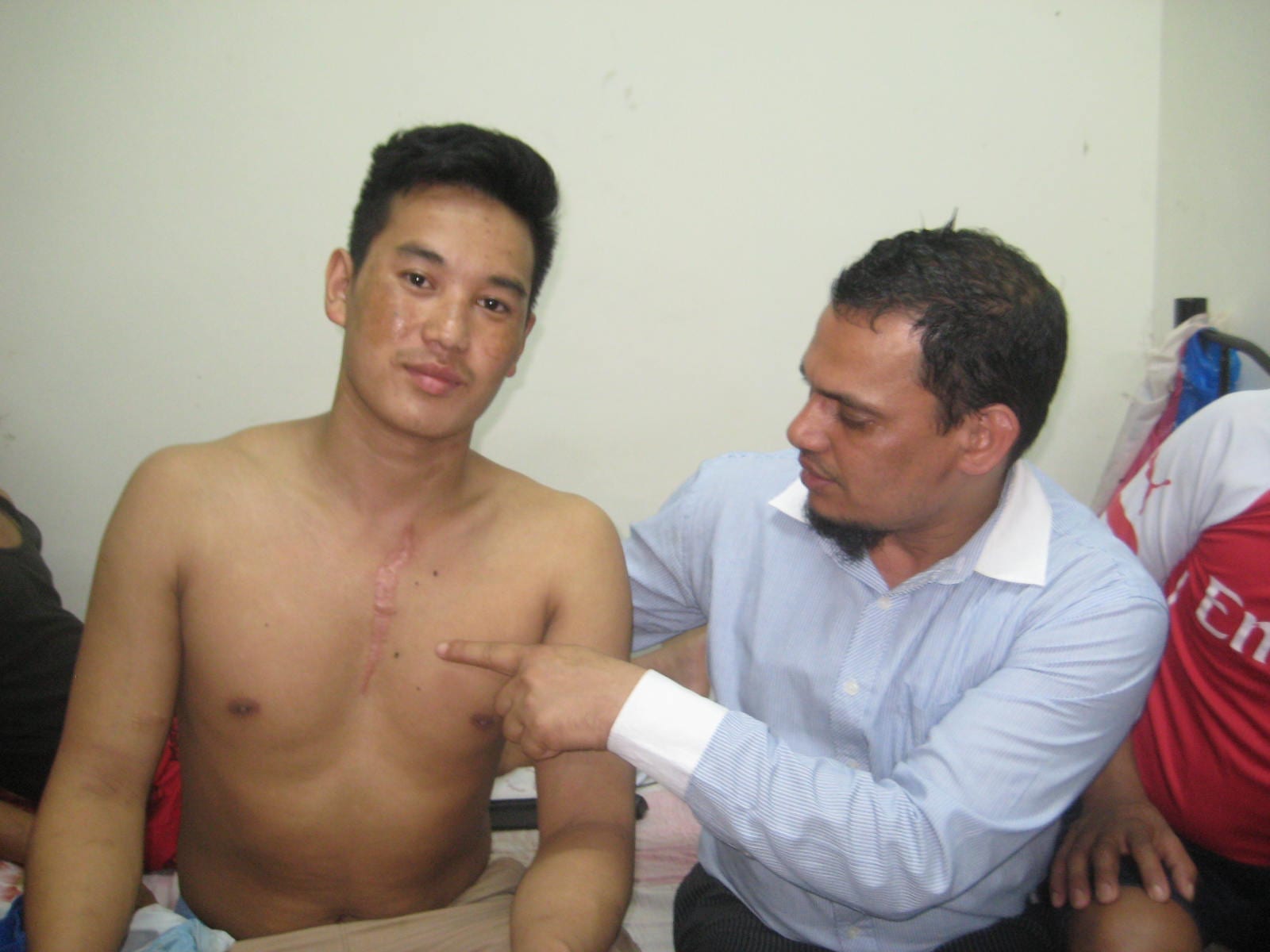
Jan 19, 2016
Migrant workers at a glass factory in Malaysia say that for the past year, they have been forced to work 16-hour days, Monday through Friday, and eight-hour days on Saturdays and Sundays—without a day off. Injuries are common, such as the deep, seven-inch long gash one worker suffered on his chest while carrying glass.
Their report is the latest in a litany of continuing violations of migrant worker rights compiled by the Malaysian Trades Union Confederation (MTUC) and the General Federation of Nepalese Trade Unions (GEFONT), both Solidarity Center allies.
Over the past year, MTUC and GEFONT have documented hundreds of cases of employer abuse of migrant workers in Malaysia, often rising to the level of forced labor. Many of these workers, from China, India, Nepal, Sri Lanka and elsewhere, say their employer had not paid them, or had given them wages far below what they had been promised before leaving home. Female workers report being sexually assaulted by their employers.
Some 400 workers from Nepal died last year in Malaysia, according to Nepal’s labor attaché, who spoke before nearly 200 workers taking part at an MTUC-sponsored International Migrants Day event last month.
Migrant workers also suffer slave-like conditions on Malaysia’s palm oil plantations, according to a Wall Street Journal report last year.
Despite a slowing economy, employers in Malaysia are recruiting more migrant workers because they are paid less and do not receive social protection benefits, says N. Gopal Kishnam, MTUC general-secretary.
“Companies like to bring in foreign workers because they are easier to manage compared with locals. They also work hard and complain less,” Gopal told the Malaysian Insider.
A Malaysian employers’ group estimates that 20,000 workers were laid off last year, excluding 6,000 Malaysian Airlines workers who were let go as part of that company’s restructuring plan. Gopal said the figure is likely to be twice as high.
In July, the U.S. State Department upgraded Malaysia in its annual Trafficking in Persons Report, citing the country’s “significant efforts” to eliminate human trafficking.
“Many employers are still wrongly holding on to passports and work passes/visas/permits,” the MTUC said last year. “When workers claim their rights through existing legal avenues, many employers simply terminate their workers, and for migrant workers this also mean the loss of ability to stay in Malaysia which is a requirement in law if they want to pursue their claims for justice.”
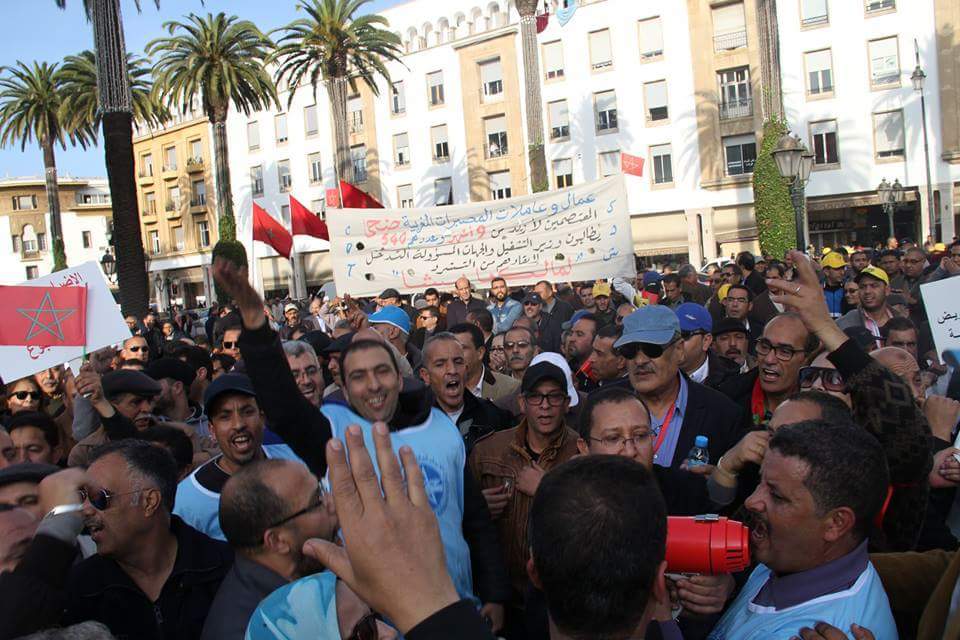
Jan 14, 2016
About four thousand workers staged a sit-in outside parliament in Rabat yesterday in a show of popular protest against socioeconomic policies that are economically harmful to working people, among them planned pension reforms, a freeze on talks with civil society groups and ongoing violations of worker rights–including the government’s refusal to negotiate with trade unions on wages and working conditions for public service workers.
Protesters expressed solidarity with student teachers beaten by police last week while peacefully marching against the decision to reduce their stipends and block their path to teaching jobs.
The sit-in is a follow-up to last month’s nationwide strike by national and local public-sector workers, organized by the four largest trade union confederations in Morocco.
Miloudi Moukharek, general secretary of the Union Marocaine du Travail (Moroccan Labor Union, UMT), said all four federations are united against the government’s unpopular policies and its unwillingness to engage in dialogue with workers on wages and other issues.
Images and video footage of police attacks on young protesters around the country on Thursday last week went viral on social media, inspiring condemnation from local and international sources.
The sit-in was organized by the Confédération Démocratique du Travail (Democratic Labor Confederation, CDT), the Federation Démocratique du Maroc (Democratic Federation of Labor, FDT), the Union Générale des Travailleurs du Maroc (General Union of Moroccan Workers, UGTM) and UMT. Solidarity Center partners with the CDT and the UMT.







